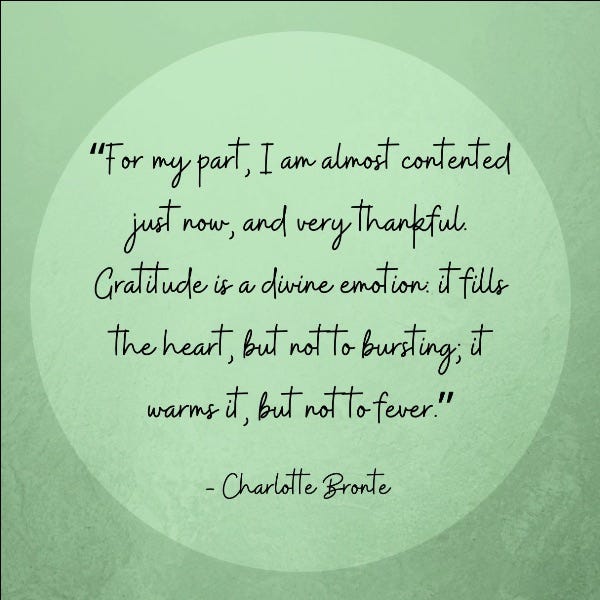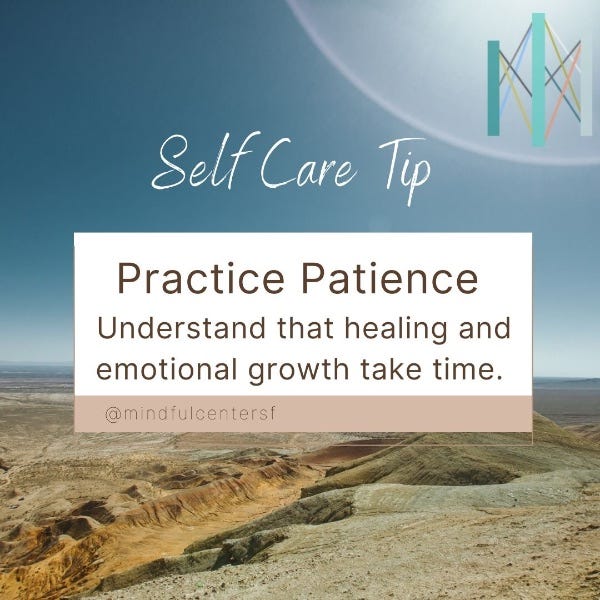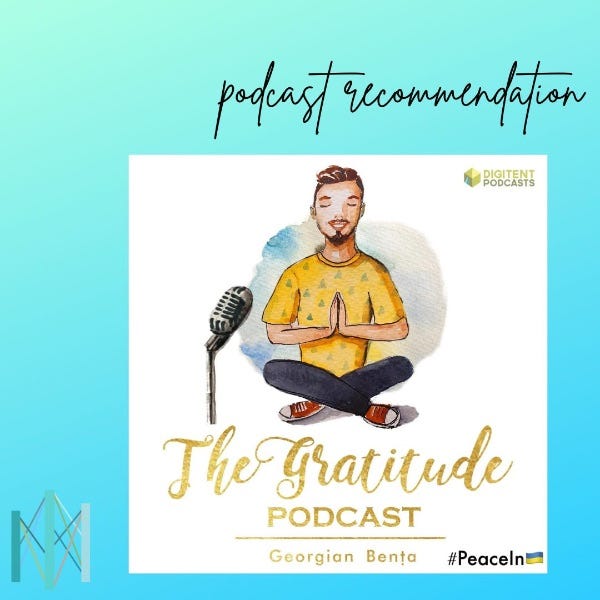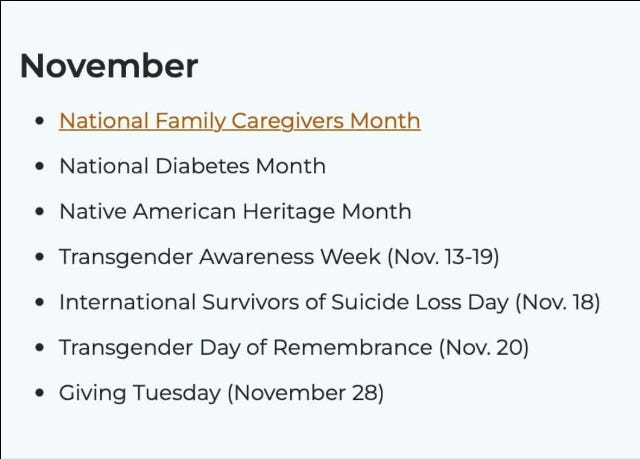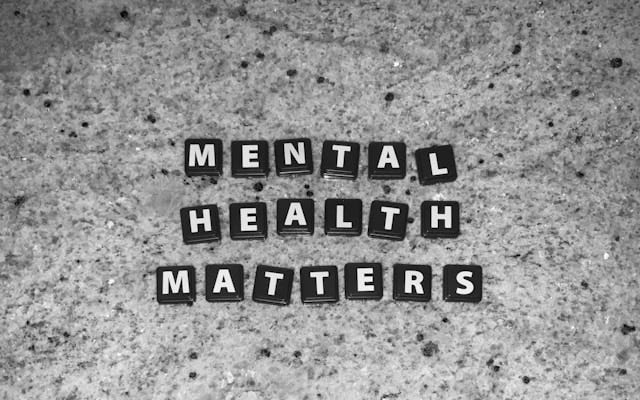Bringing You A Moment of Mindfulness
Welcome back to your CMP newsletter. November is a month recognizing many things from family caregivers to transgender awareness, but of course Thanksgiving is the big thing that's on so many people's minds. As a result, we find ourselves thinking a lot about gratitude right now.
Practicing gratitude can be such a powerful daily self-care routine. It can help you find the silver lining in the toughest of times and focus on the things that are good right now. And yet, when facing individual and global struggles, finding gratitude can feel challenging. It's not about forcing it. It's about figuring out what to do gently when you want to feel thankful but you're finding it difficult. That's what this month's newsletter is about.
Before we dig in, though, here's a reminder to take just a moment to land here. You do not need to multi-task. You don't have to think about what's next. Be right here with these words on this page. Listen to your own heartbeat and feel your feet on the ground as you take in these ideas. We are happy to be here in this space with you.
Gratitude In Times When Gratefulness Is Challenging
Gratitude is the practice of recognizing and appreciating the positive aspects of life, no matter how small. It involves acknowledging the good things that exist, even amidst difficulties. Practicing gratitude, through mindfulness, affirmations, gratitude lists, thank you cards, etc. can be a powerful part of your self-care routine. It can also benefit your relationships and community. However, there are times when things are so challenging - personally and/or at a global scale - that trying to practice gratitude feels forced and false. We don't want that. You can be authentic with others and true to yourself while still navigating some sense of gratitude in challenging times.
BENEFITS OF GRATITUDE PRACTICE
Practicing gratitude, even during challenging times, offers a multitude of benefits for both the individual expressing gratitude and those who receive it:
Benefits for the Self:
Enhanced Mental Well-being: Gratitude has been shown to reduce stress, anxiety, and symptoms of depression. Expressing gratitude during tough times can help individuals cope with difficult emotions and improve their overall mental health.
Positive Perspective: Gratitude encourages a more positive outlook on life. By focusing on the aspects they are thankful for, individuals can shift their perspective and find hope, even amidst adversity.
Increased Resilience: Acknowledging the positives, no matter how small, can enhance personal resilience. It empowers individuals to bounce back from adversity and develop a sense of inner strength.
Self-Reflection: Gratitude prompts individuals to reflect on their lives and recognize the valuable lessons and personal growth that challenging times can offer. This self-reflection can lead to increased self-awareness.
Enhanced Coping Mechanisms: Gratitude can serve as a coping mechanism during tough times. It offers a healthy way to manage emotions and provides a sense of control and emotional regulation.
Improved Health: Studies have linked gratitude to improved physical health, including better sleep and a stronger immune system. Better health contributes to an individual's overall resilience during challenging times.
Benefits for Others:
Strengthened Relationships: Expressing gratitude can strengthen interpersonal relationships. It fosters trust, empathy, and a sense of connection between individuals, making it easier to navigate challenges as a team.
Emotional Support: When someone expresses gratitude to others during challenging times, it provides emotional support and reassurance. It can help those around them feel appreciated and valued.
Motivation: Gratitude can motivate others to provide continued support and encouragement. When individuals feel appreciated, they are more likely to offer help and assistance when needed.
Enhanced Empathy: Gratitude fosters empathy and understanding. It encourages individuals to consider the perspectives and feelings of others, even during challenging circumstances.
Stress Reduction: The act of receiving gratitude can reduce stress and anxiety for those who offer support. It can create a more positive and supportive environment.
Improved Mental Health: Just as expressing gratitude enhances mental well-being for the individual, receiving gratitude can have a similar positive effect on the mental health of others. It creates a mutually beneficial cycle of well-being and emotional support.
During challenging times, gratitude becomes an even more potent tool for individuals and those around them. It offers a way to navigate adversity, maintain mental well-being, and foster a sense of togetherness and support.
THE GRATITUDE DILEMMA
During the holiday season, including Thanksgiving, we may feel pressure to be overwhelmingly thankful, and this can sometimes lead to feelings of inauthenticity.
Personal Challenges: On an individual level, people may be experiencing personal hardships, such as health issues, financial struggles, or the loss of a loved one. During such times, it can be incredibly hard to muster up feelings of gratitude when life feels unjust or overwhelming.
Global Concerns: The state of the world, with its ongoing challenges, crises, and uncertainties, can cast a shadow over the holiday season.
Winter Blues: The winter season itself can pose challenges to our well-being. Seasonal affective disorder (SAD), a type of depression related to the change in seasons, can lead to feelings of sadness and fatigue, making it hard to find joy and gratitude.
Unrealistic Expectations: During Thanksgiving and the holidays, there's often an expectation of perfection, from a flawless turkey to harmonious family gatherings. When these expectations aren't met, it can be easy to focus on what's lacking instead of what's present.
WHEN YOU FIND IT TOO CHALLENGING TO AUTHENTICALLY EXPRESS GRATITUDE
Despite awareness of all of these benefits, you may find that it's just too challenging to authentically feel or express gratitude in the midst of really troubling times. That's okay. Start by acknowledging to yourself what you do feel. Then try these things:
Self-Compassion: Instead of focusing on gratitude, shift your attention to self-compassion. Be kind and understanding to yourself during tough times. Recognize that it's okay to feel the way you do, and practice self-care to nurture your emotional well-being.
Acceptance: Practice acceptance of your emotions and the circumstances you're facing. By acknowledging the challenges and accepting your feelings as they are, you can reduce the pressure to feel grateful. It's essential to embrace your authentic emotions without judgment.
Mindfulness: Engage in mindfulness techniques to stay present and aware of your feelings. Mindfulness can help you navigate difficult emotions with greater ease and without the expectation of gratitude.
Emotional Expression: Talk to friends, family, or a mental health professional about your feelings. Sharing your emotions can be a cathartic experience and provide an outlet for your distress. It's okay to seek support and understanding from others.
Journaling: Instead of a gratitude journal, consider starting an emotions journal. Write down your thoughts and feelings without judgment. This process can help you process your emotions and gain insight into your experiences.
Acts of Kindness: Engage in acts of kindness, not as an expression of gratitude, but as a way to contribute positively to the world. Helping others, even when facing your challenges, can create a sense of connection and purpose.
Time and Healing: Understand that challenging times are part of life's journey. Healing and emotional recovery take time. While you may not feel grateful in the moment, it's possible that with time and reflection, you may find moments of appreciation and growth.
Seek Professional Help: If you find that your emotions are overwhelming and challenging to manage, consider seeking therapy or counseling. We can help. Contact us today.
We would love to hear your thoughts on this topic. Connect with us on Instagram, Facebook, TikTok, and Twitter.
Types Of Therapy That Embrace Gratitude
Our therapists will meet you where you are. If you're not feeling gratitude or don't want to talk about gratefulness, that's okay. If, however, you want to find ways to bring gratitude practice into your life, there are many therapeutic approaches that align with that. Here are some examples:
Positive Psychology: Positive psychology is a field of psychology that focuses on the positive aspects of human experience. Gratitude is a core concept in positive psychology, and therapists often use exercises like gratitude journaling to help clients build a more positive outlook on life.
Cognitive-Behavioral Therapy (CBT): While CBT primarily focuses on addressing negative thought patterns, therapists may incorporate gratitude exercises to help clients reframe their thinking and adopt a more positive and appreciative mindset.
Mindfulness-Based Therapies: Therapies like Mindfulness-Based Stress Reduction (MBSR) and Mindfulness-Based Cognitive Therapy (MBCT) emphasize the practice of being present and fully engaged in the moment. Gratitude exercises are often included to promote mindful awareness and appreciation of one's surroundings and experiences.
Acceptance and Commitment Therapy (ACT): ACT encourages clients to accept their thoughts and feelings while committing to actions that align with their values. Gratitude is aligned with ACT principles, as it involves acknowledging and accepting one's experiences while actively seeking positive change.
Narrative Therapy: Narrative therapy explores the stories and narratives people construct about their lives. Gratitude can be used to help clients reshape their life narratives, emphasizing positive experiences and personal strengths.
Solution-Focused Brief Therapy (SFBT): SFBT is goal-oriented and focuses on solutions rather than problems. Gratitude is integrated into this approach as a resource that clients can draw upon to identify and work toward solutions.
Strengths-Based Therapies: Therapies that focus on identifying and building upon an individual's strengths often use gratitude exercises to help clients recognize and appreciate their strengths and capabilities.
Interpersonal and Relational Therapies: In couples therapy, family therapy, and other relational therapies, gratitude is used to foster appreciation and enhance emotional connections among individuals.
There are many different approaches to therapy and gratitude practice fits well within many of them. And we want you to know that we grateful for you and all of the clients that seek therapy with our associate therapists here at CMP.
Podcast recommendation:
The Gratitude Podcast is by Georgian Benta who says: "My goal with this project is to inspire those that find it harder to be grateful, to choose to live a life filled with gratefulness or at least to get a boost of this amazing feeling when things don’t seem to go the right way."
Gratitude Practices Around the World
Across the globe people celebrate and convey their thankfulness through unique gratitude rituals. These cultural expressions are as varied as the world itself, but they all share a common thread: the act of acknowledging and appreciating the positive aspects of life, no matter how small. Here are some examples that we found in our research ... please tell us if you know more about any of these or if you have a cultural gratitude practice that you'd like to share.
The Japanese Tradition of Oseibo
Oseibo, which means "year-end gift," is a practice where gifts are exchanged to show appreciation, particularly between business associates, friends, and family members. It is a heartfelt gesture that symbolizes respect and gratitude for the support and kindness received throughout the year.
Thai Loy Krathong Festival
In the heart of Thailand is the Loy Krathong Festival, celebrated on the full moon night of the twelfth lunar month. During this festival of lights, people release beautifully decorated floating baskets, or krathongs, onto rivers and waterways to honor the goddess of water and express their gratitude for her blessings. As the krathongs float away, they carry away negativity and allow people to start anew with gratitude in their hearts.
The Mexican Tradition of Las Mañanitas
In Mexico, "Las Mañanitas" is a cherished gratitude tradition that goes beyond simply saying thank you. It is a way of serenading loved ones on special occasions like birthdays, anniversaries, or significant life events. The heartwarming serenade, sung with heartfelt lyrics, expresses love, appreciation, and well wishes. This traditional practice serves as a touching way to show gratitude to friends and family.
The Vibrant Brazilian "Muito Obrigado"
In Brazil, the phrase "Muito Obrigado" is often used as an enthusiastic way of expressing gratitude. Translating to "Thank you very much," this phrase encapsulates the exuberance and warmth that are characteristic of Brazilian culture. It's a reminder that gratitude doesn't always need to be understated; sometimes, expressing it with exuberance is just as meaningful.
The Moroccan Art of Gifting
In Morocco, the practice of gift-giving is an essential part of expressing gratitude and maintaining social relationships. The act of offering a gift, known as "tangia," is a way to say thank you and show respect for the people who have touched one's life. Moroccan culture values the art of gifting as a powerful means of expressing gratitude and maintaining strong social bonds.
The South Korean Chuseok Festival
This is celebrated with deep gratitude and respect for ancestors. During this harvest festival, families gather to pay tribute to their forebears through ancestral rites and rituals. The preparation and sharing of traditional foods like songpyeon (rice cakes) symbolize thankfulness for a bountiful harvest.
The Zulu Tradition of Ukudlala
The tradition of Ukudlala is a unique way of showing gratitude and celebrating milestones. It involves the act of playing and singing while celebrating achievements, expressing thanks, and embracing joy. The Zulu people use this joyful tradition as a way of expressing their gratitude for life's blessings.
Oktoberfest in Germany
While largely known for its beer and festivities, Oktoberfest has its roots in giving thanks. The event began as a royal wedding celebration and evolved into an annual festival where people express gratitude for the harvest.
Finally, we wanted to share some of the latest news articles about mental health with you from around the web:
- NY Times: Music as a form of mental health care
- The Verge: HTC’s Vive Focus 3 has a new, far-out mission: astronaut mental health
- APA: Stress in America 2023: A nation recovering from collective trauma
- KCUB: What Are Unalaskans Grateful For? Teen Council Discusses Gratitude Month
Therapy is for everyone. It can help immensely when you're struggling or in crisis. However, you don't have to wait until then to benefit from therapy. Many of CMP's therapists have openings for new clients. Contact us today to learn more or check out our therapist directory to find someone who is a good fit for you.





